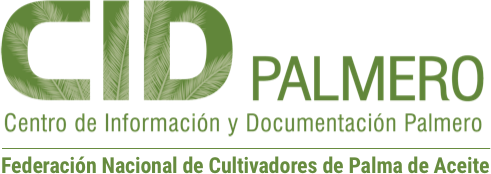| dc.creator | Echeverry G., Juan C. | |
| dc.date | 2000-01-01 | |
| dc.date.accessioned | 2020-07-25T11:17:54Z | |
| dc.date.available | 2020-07-25T11:17:54Z | |
| dc.identifier | https://publicaciones.fedepalma.org/index.php/palmas/article/view/814 | |
| dc.identifier.uri | http://repositorio.fedepalma.org/handle/123456789/139441 | |
| dc.description | In his speech, he pointed out the advantages of Colombia within the palm market and the actions that the private sector and the Government have been carrying out to give incentive to cultivation and production. Colombia has abundant soils and appropriate ecosystems for the cultivation of oil palm and therefore can increase the plantings and the production of the entire chain, consolidating its palm growing leadership in Latin America and its position as the fourth producer in the world. According to the estimates of the Vision exercise carried out by Fedepalma, by the year 2020 Colombia will have more than 630 thousand hectares planted with palm, utilizing only 20% of the soils which the country has for its plantings. The comparative advantages of this chain are centered in its great agroecological potential, in the sustained growth of the surface planted with palm, in the technological progress and innovations, in accordance with the market requirements and needs, in the growing institutional and agroindustrial development, the increase in national and worldwide consumption of oils and fats and in the diversification of the uses of the products associated with the development of oleochemistry. In technological research and development, work is being done in the development of cooperation agreements with Malaysia and other genetic material producer countries for the cultivation of oil palm. Cenipalma has been determinant in the development of palm oil oleochemistry in Colombia. A financial instrument which will have important effects in the development of the palm sector is the establishment of the Farming and Animal Husbandry Investment Fund - FIA -, which will contribute risk capital resources for permanent crops. It will also have resources coming from the patrimony of the Fund for Financing the Farming and Animal Husbandry Sector - Finagro- and from external credit from the Interamerican Development Bank - BID - which should be implemented at the beginning of 2001. This instrument will have a civil disorder security system. As a complement to the reactivation policy, the national government designed, implemented and initiated the Farming and Animal Husbandry Supply Program - Proagro - whose objective is to increase the production and improve competitivity, through the increase in the physical yields and the reduction in the costs of goods. | en-US |
| dc.description | En su intervención resaltó las ventajas de Colombia dentro del mercado palmero y las acciones que el sector privado y el Gobierno vienen adelantando para incentivar el cultivo y la producción. Colombia cuenta con abundantes suelos y ecosistemas apropiados para el cultivo de la palma de aceite, por lo que puede incrementar las siembras y la producción de toda la cadena, consolidando su liderazgo palmicultor en Latinoamérica y su puesto como cuarto productor del mundo. Según las estimaciones del ejercicio de visión realizado por Fedepalma, para el año 2020 Colombia tendrá sembradas más de 630 mil hectáreas de palma, aprovechando tan sólo un 20% de los suelos con los que cuenta el país para su siembra. Las ventajas comparativas de esta cadena se centran en su gran potencial agroecológico, en el crecimiento sostenido de la superficie sembrada de palma, en los avances e innovaciones tecnológicas acorde con los requerimientos y necesidades del mercado, en el desarrollo institucional y agroindustrial en crecimiento, el aumento del consumo nacional y mundial de aceites y grasas y en la diversificación de usos de los productos asociados al desarrollo de la oleoquímica. En investigación y desarrollo tecnológico, se viene trabajando en el desarrollo de acuerdos de cooperación con Malasia y otros países productores de material genético para el cultivo de palma de aceite. Cenipalma ha sido determinante en el desarrollo de la oleoquímica del aceite de palma en Colombia. Un instrumento financiero que tendrá efectos importantes en el desarrollo del sector palmero es el establecimiento del Fondo de Inversión Agropecuaria -FIA-, que aportará recursos de capital de riesgo para cultivos permanentes. También contará con recursos provenientes del patrimonio de Finagro y de crédito externo del BID, el cual debe estar implementado a principios del 2001. Este instrumento contará con un esquema de seguro de desorden civil. Como complemento a la política de reactivación, el gobierno nacional diseñó, implemento y puso en marcha el Programa de Oferta Agropecuaria-Proagro-, cuyo objetivo es incrementar la producción y mejorar de la competitividad, mediante el aumento de los rendimientos físicos y reducción de costos de bienes. | es-ES |
| dc.format | application/pdf | |
| dc.language | spa | |
| dc.publisher | Fedepalma | es-ES |
| dc.relation | https://publicaciones.fedepalma.org/index.php/palmas/article/view/814/814 | |
| dc.rights | Derechos de autor 2017 Revista Palmas | es-ES |
| dc.rights | https://creativecommons.org/licenses/by-nc-nd/4.0 | es-ES |
| dc.source | Revista Palmas; Vol. 21 Núm. especial, (2000); 24-31 | es-ES |
| dc.source | 0121-2923 | |
| dc.subject | palma de aceite | es-ES |
| dc.subject | elaeis guineensis | es-ES |
| dc.subject | políticas investigación | es-ES |
| dc.subject | alianzas | es-ES |
| dc.subject | desarrollo económico y social | es-ES |
| dc.subject | Colombia | es-ES |
| dc.subject | sector palmicultor | es-ES |
| dc.title | Support measures for sectorial reactivation | en-US |
| dc.title | Medidas de apoyo a la reactivación sectorial | es-ES |
| dc.type | info:eu-repo/semantics/article | |
| dc.type | info:eu-repo/semantics/publishedVersion | |


